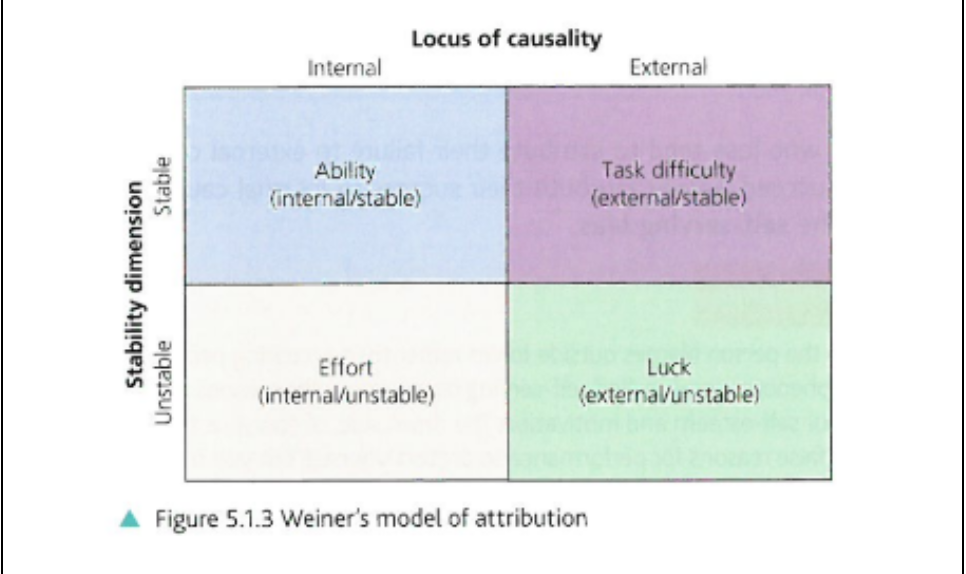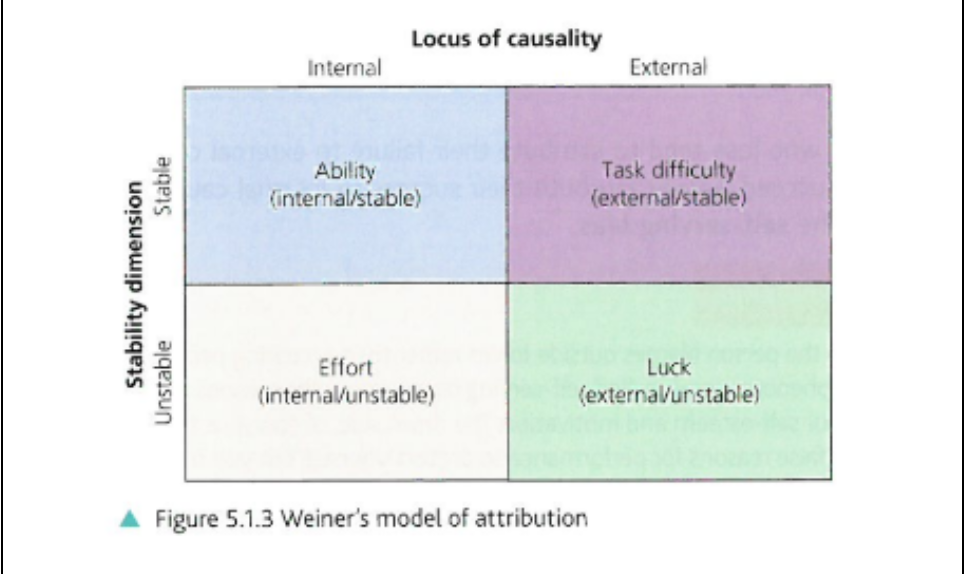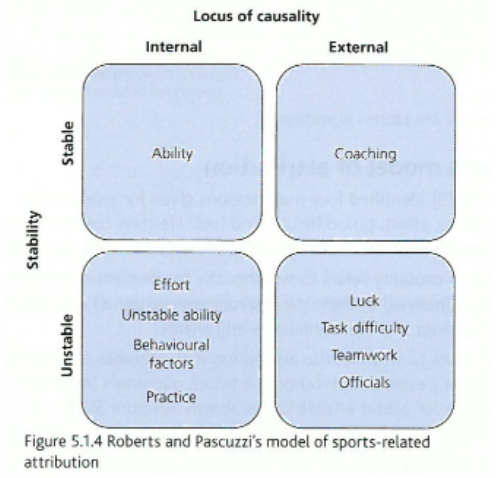5.1 (A2) : attribution in sport
1/22
Earn XP
Description and Tags
Name | Mastery | Learn | Test | Matching | Spaced | Call with Kai |
|---|
No analytics yet
Send a link to your students to track their progress
23 Terms
definition of attribution
perceived causes of a particular outcome
Attribution is linked to motivation
The reasons, justifications that we give for winning, losing or drawing in sports competitions
The reasons are likely to affect our motivation towards the next task
process of attribution
outcome of event → available info → casual attribution → affective response and expectancy for future results → decision on subsequent participation
weiner’s model of attribution : reasons
4 reasons
ability
effort
task difficulty
luck

weiner’s model of attribution : dimensions
2 dimensions
Locus of causality
Attributions come from within a person (internal) or from the environment (external)
Affects a person’s feelings of pride, confidence or shame
Stability
Whether attribution is changeable or unchangeable
Affects a person's expectations of a future outcome

problems with wieners model
not sport specific
Task difficulty changes frequently in sport because opposition changes
Applied in a general sense
Can be used to promote reasons for sports outcomes that can be motivating
if reasons for winning are stable ….
… motivated to achieve again
if failure is attributed to an unstable factor …
more likely to try again as a factor can be changed
Roberts and Pascuzzi
modified weiner’s model to be sport specific
far more attributions names
1979

Sports performers who attribute loss to external causes or those that attribute winning to internal factors ….
Self serving bias is shown
Helps to protect a person's confidence
May be giving yourself false reasons and will therefore not improve as real reasons for improvement are not addressed
Limits sense of shame and highlights personal achievement and success
self serving bias
a person’s tendency to attribute their failure to external reasons.
An excuse to explain their poor performance
Helps to protect a person's confidence
controllability dimension
→ whether attributions are under control of the performer or under the control of others , or whether they are uncontrollable
E.g Luck - nothing can be done to change this factor
coaches and attribution
Coaches tend to praise effort and controllable success
Coaches tend to punish or criticise lack of effort and controllable failures
Concentrating on external uncontrollable factors if not useful if you want to turn failure to success
ability
internal
stable
uncontrollable
effort
internal
unstable
controllable
task difficulty
external
stable
can be either controllable or uncontrollable
luck
external
unstable
uncontrollable
learned helplessness
Belief that failure is inevitable
Belief they have no control over factors that lead to failure
Feeling of hopelessness when faced with a particular situation or a group of situations
e.g learned helplessness
Particular situation → specific learned helplessness
I’m hopeless at football
Groups of situations → global learned helplessness
I’m hopeless at sport
learned helplessness and attribution
Low achievers contribute their failure to uncontrollable factors which can lead to learned helplessness
High achievers see failure as a learning experience and will attribute failure to controllable unstable factors
They have a need to achieve
Mastery orientation
mastery orientation
Individual is motivated by becoming an expert in skill development or sports performance
Strive to become better at a sport or task
Develop their competence by acquiring new skills and mastering new situations
Do not compare performance to others
Further their understanding of the sport, fitness and sport performance
Opposite to learned helplessness
mastery orientation and attribution
Attributes failure to internal, controllable and unstable factors such as effort
attribution retraining
an optimise sports performance
Change learned helplessness into mastery orientation
Many attributions are subjective and not desirable for future progression
Attributions need to relate to lead to success in the future
Failure
Should attribute to controllable unstable factors
If retrained attribution more likely to lead to mastery orientation
e.g attribution retraining
E.g A hockey player that used to play for a team that constantly blamed officials for their poor results
Helped team to draw together but team had a bad reputation
Realistically officials were not attributing to all failures